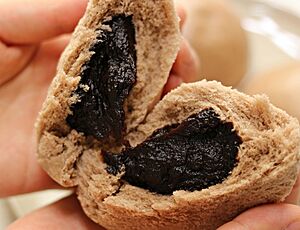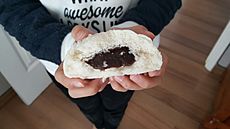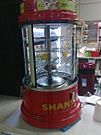Hoppang facts for kids
 |
|
| Type | Jjinppang |
|---|---|
| Place of origin | South Korea |
| Serving temperature | Hot |
| Main ingredients | Wheat flour, red bean paste |
| Ingredients generally used | butter, salt, sugar |
| 200 kcal (837 kJ) | |
Hoppang (which means "hot bread" in Korean) is a super popular warm snack in South Korea. It's a type of steamed bread called jjinppang, made easy to grab and eat. Hoppang usually has a sweet, smooth red bean paste inside. It's a perfect treat, especially when it's cold outside!
Contents
The Story of Hoppang
How Hoppang Was Invented
Hoppang was created by a person named Heo Chang-seong. He was the founder of a food company called Samlip Foods. In 1969, he visited Japan and saw people selling steamed buns on the street. These buns were similar to Chinese baozi. This gave him a great idea!
Heo Chang-seong wanted to find a product that would help his bakery sell more during the slow winter months. He worked hard to create his own recipe. Finally, in 1971, Hoppang was ready and introduced to the Korean market. It quickly became a favorite snack!
What Does "Hoppang" Mean?
The Name's Fun Meaning
The name Hoppang started as a brand name for the ready-to-eat steamed buns from Samlip. This happened in 1970. The name combines two parts:
- Ho, ho is a sound. It's like the sound you make when you blow on something hot, like a warm steamed bun.
- Ppang is the Korean word for bread.
So, Hoppang means "hot bread" that you blow on! The name also has a sweet meaning: "The whole family eats together and smiles; Ho ho." Because it was so popular, Hoppang soon became the common name for all easy-to-eat steamed buns.
Different Kinds of Hoppang
Popular Hoppang Fillings
The most common Hoppang has a sweet red bean paste filling. But there are many other yummy kinds too! You can find Hoppang filled with:
- Vegetables and meat
- Pizza toppings
- Pumpkin
- Spicy buldak (chicken)
Where to Find Hoppang
You can buy Hoppang in a few different ways. Many supermarkets and grocery stores sell them in packs. These are ready for you to steam or heat in a microwave at home.
During the winter, many convenience stores sell warm Hoppang. They keep them hot and steamy in special cylindrical heating machines. It's a perfect warm snack to grab on the go!
Gallery
See also
 In Spanish: Hoppang para niños
In Spanish: Hoppang para niños
- Bungeo-ppang
- Hotteok
- List of buns
- List of Korean desserts
- List of steamed foods
- List of stuffed dishes
References
 | Victor J. Glover |
 | Yvonne Cagle |
 | Jeanette Epps |
 | Bernard A. Harris Jr. |



